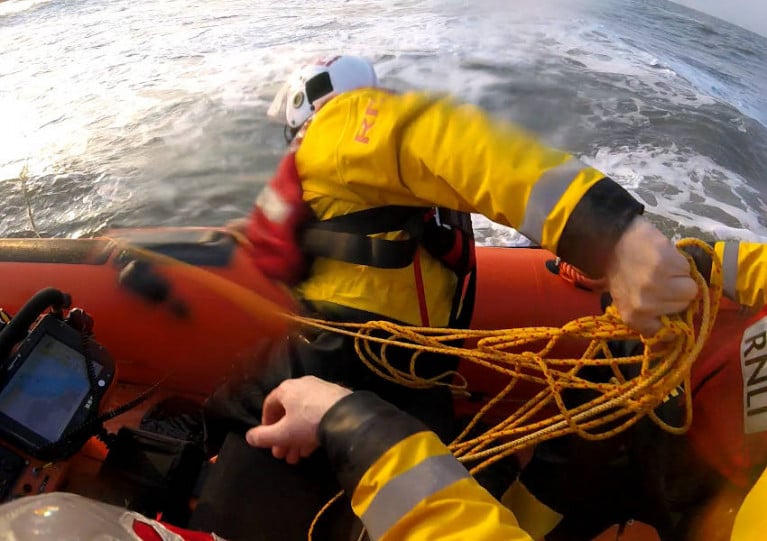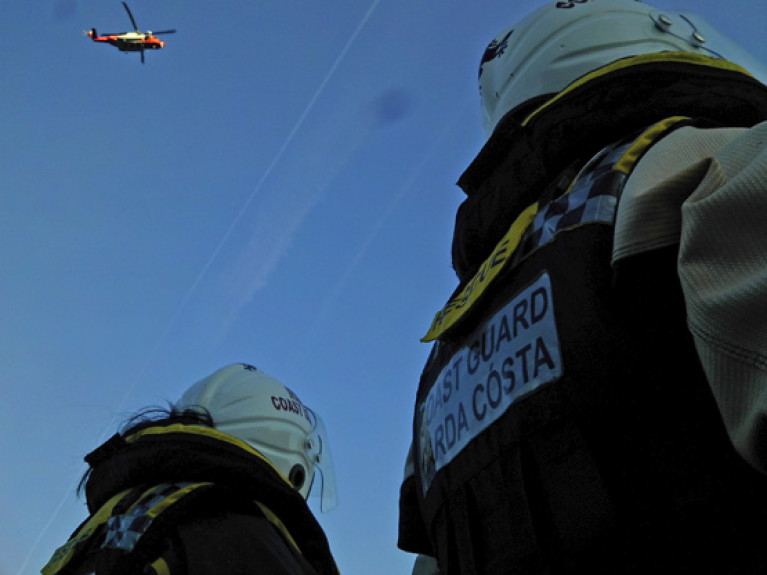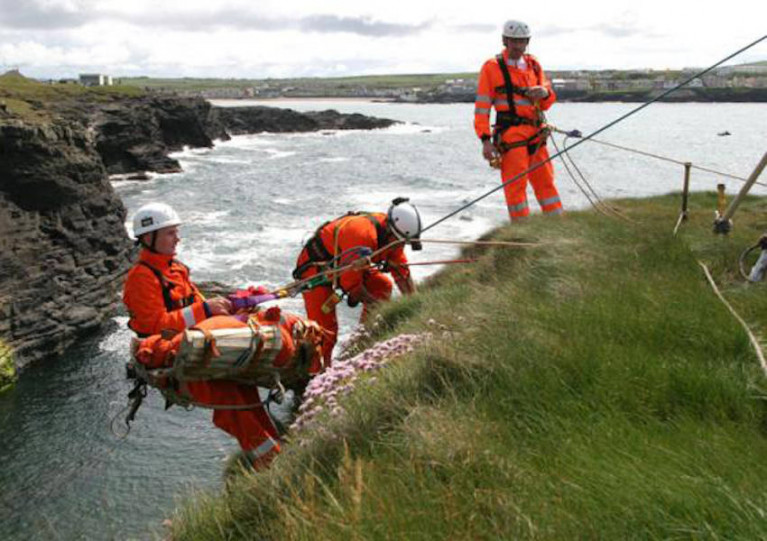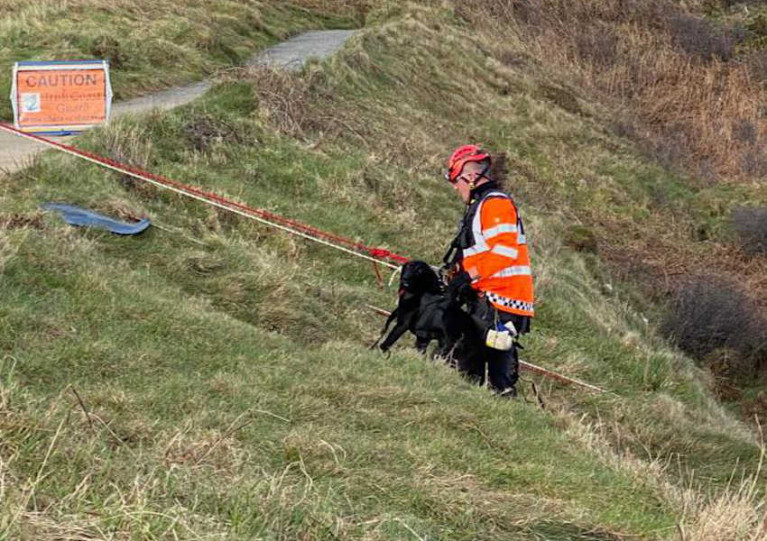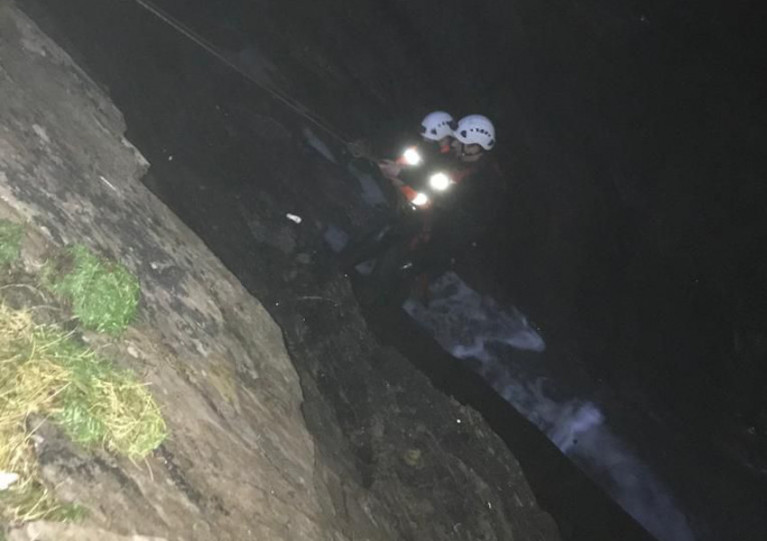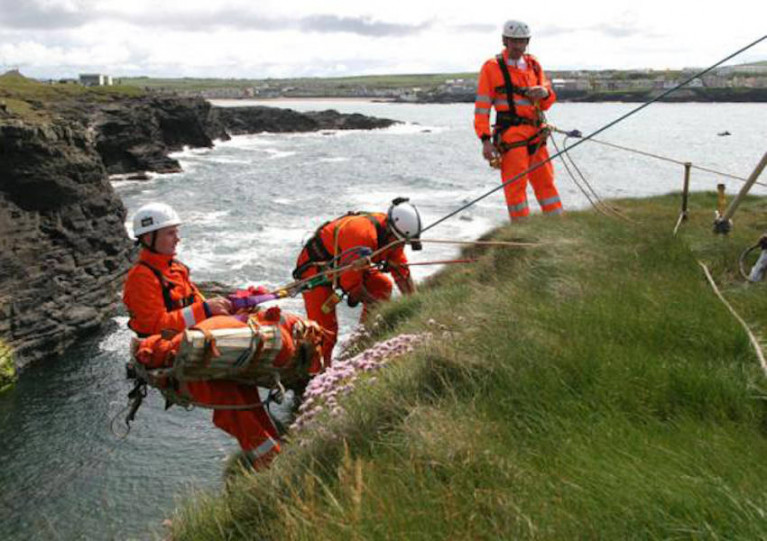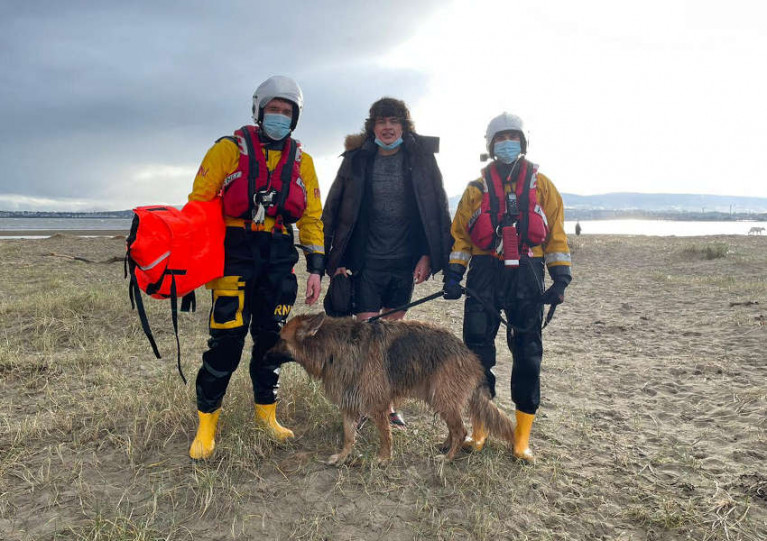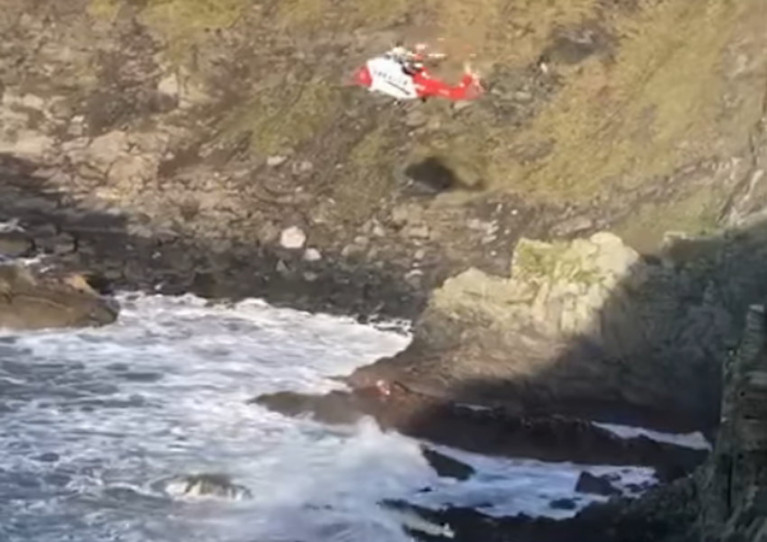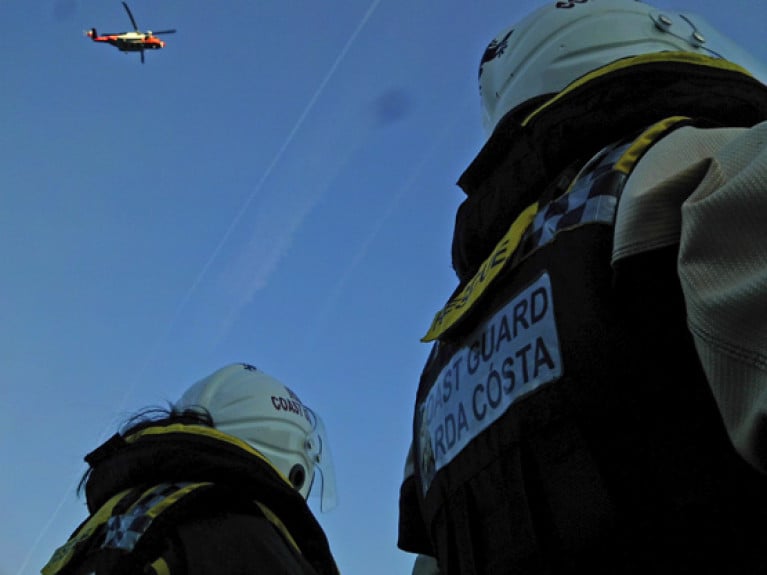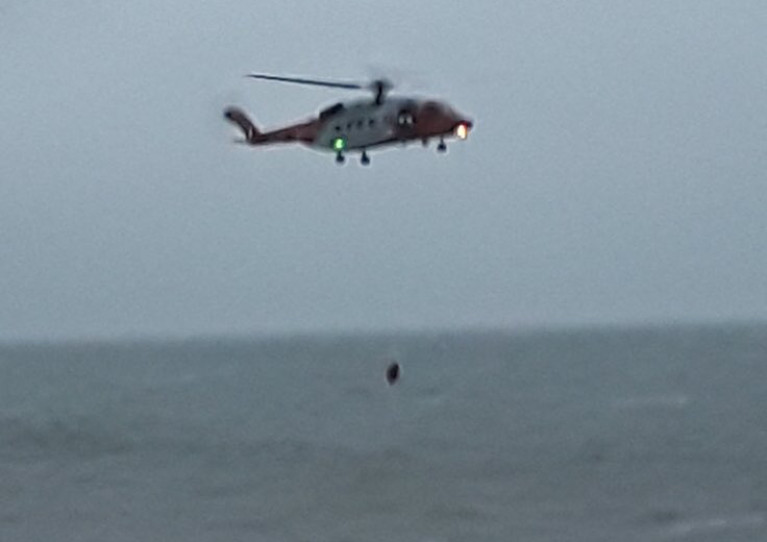Displaying items by tag: Irish Coast Guard
Skerries RNLI’s volunteers launched their inshore lifeboat on Wednesday evening (21 April) as part of a multi-agency response to reports of a swimmer in difficulty near the Martello tower in Balbriggan.
The Atlantic 85 lifeboat Louis Simson was launched within minutes of the crew being paged just before 7pm and proceeded directly to the area indicated.
On arrival the crew found the Dublin-based Irish Coast Guard helicopter Rescue 116 already on scene and winching a man from the water.
The casualty was the lowered onto the beach and into the care of an ambulance crew and members of Dublin Fire Brigade who administered first aid before he was transferred to hospital.
Meanwhile, further reports came in that other swimmers had entered the water to assist the casualty and a subsequent emergency call raised concerns that there may still be someone in the water.
Rescue 116, Skerries RNLI and the Skerries Coast Guard unit coordinated to carry out a search of the immediate area covering the water and the shoreline.
The lifeboat investigated a number of objects at the request of Rescue 116, including a lifebuoy which they recovered into the lifeboat.
When Dublin Coast Guard was satisfied that the area had been thoroughly searched and there were no further swimmers in danger, the lifeboat was stood down and returned to station.
Speaking about the callout, press officer Gerry Canning said: “When a person is in trouble in the water, every second counts. Rescue 116 were on scene very quickly and it was an excellent response from all of the emergency services who worked brilliantly together.
“Our thoughts are with the friends and family of the man taken from the water and we hope he makes a full recovery.”
Irish Coast Guard Receives ‘Great Place to Work’ Award
The Irish Coast Guard has been certified as a ‘Great Place to Work’ by a leading employee satisfaction audit firm.
In 2019 the IRCG partnered with the Great Place to Work Institute to develop and implement an engagement programme with staff and volunteers as it undergoes an extensive programme of reform.
An engagement tool called the Trust Index & Culture Assessment (TCA) was made available to all coastguard personnel and was specifically designed to collect their personal perspectives on the organisation and on wider reform activities.
Commenting on the accolade, the Irish Coast Guard’s acting director Eugene Clonan said: “We are delighted to be recipients of this year's ‘Great Place to Work’ award.
“Engaging in the programme has allowed us to hear the perspectives of all our coastguard members and to create a ‘just’ culture that encourages open engagement and supports the Coast Guard’s wider programme of reform.
“We are proud of our teams and their certification as great places to work and will continue to work together to continuously improve our organisation and resolve the many challenges that remain.”
Clonan added: “This process is much more than a simple survey of attitudes of those working in the organisation and our volunteers around the coast.
“It is about building a sense of ownership and trust across the coastguard, where people can feel empowered to develop as individuals, highlight issues of concern without fear and engage in a constructive and solution-oriented way to the challenges that face a strongly community-based organisation.
“We are an organisation that has been through some traumatic events over the last five years and we are keen to learn from these events.
“That is at the heart of this initiative — a clear demonstration that we are willing to learn, develop and improve how we do what we do. The icing is that this work is being recognised by an outside organisation.”
The Irish Coast Guard has cited safety reasons for its temporary suspension of cliff rescues, as RTÉ News reports.
A spokesperson said the move is in line with its safety management system “and the function will be resumed when it has been is deemed safe to do so”.
Areas affected by the suspension will be serviced by existing coastguard units and the SAR helicopter network, the spokesperson added.
The move comes just weeks after some coastguard cliff rescue team members claimed they had not received any training in six months amid pandemic restrictions, as previously noted on Afloat.ie.
Jacko the Dog Lifted to Safety by Howth Coast Guard After Cliff Fall
Howth Coast Guard’s cliff rescue team came to the aid of relieved owners after Jacko the dog fell over a cliff on Howth Head yesterday afternoon, Friday 26 February.
It emerged that Jacko had been distracted by wildlife while out for a walk on the cliff path, and had slipped 100 feet down the steep cliff face to the rocks below.
Shortly after 1pm, Howth’s Irish Coast Guard unit dispatched a team of 12 to the scene near Casana Rock, where they set up their ropes and lowered a rescue climber with a dog harness over the cliff edge.
Shortly after, Jacko had been lifted to safety and reunited with his owners, who swiftly brought him to the vet for treatment for injuries he sustained in his fall.
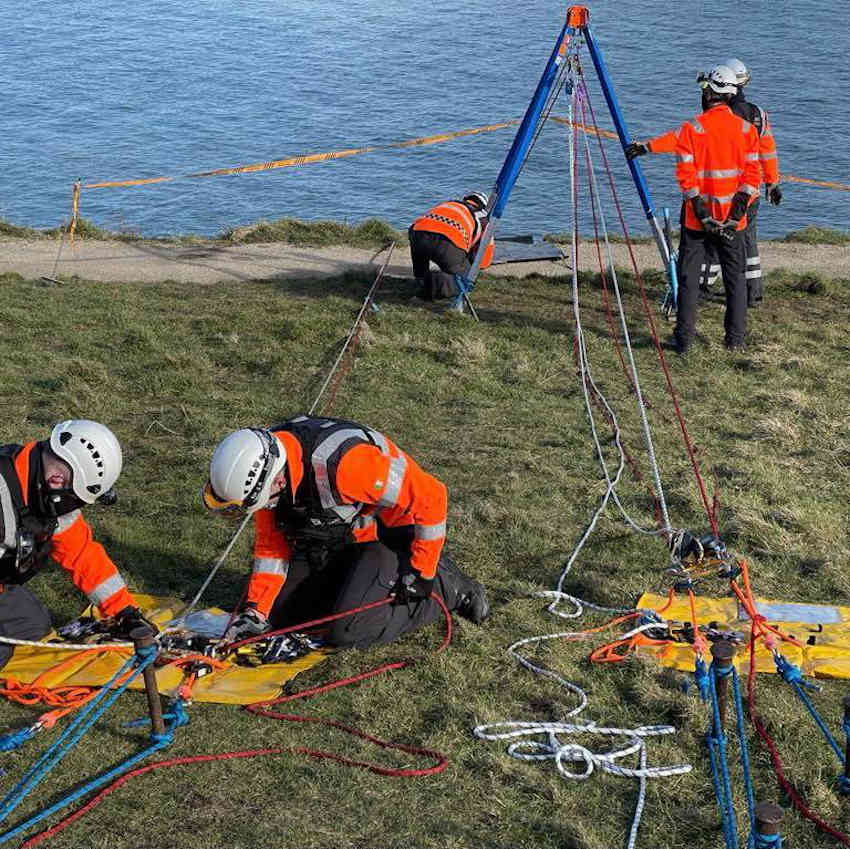
“We are appreciative that the owners remained on the path and called for help immediately,” Howth Coast Guard said.
The unit added that its members attend over 100 calls a year, and with travel limitations in place this year is expected to be as busy if not busier than previous.
All are encouraged to call for the coastguard at 112 or 999 if they see someone who may be in trouble on the cliffs, beach or water.
Woman Trapped in West Cork Sea Inlet Rescued By Coastguard & Lifeboat Crew
A woman was rescued from a sea inlet in West Cork after a more than 90-minute ordeal yesterday evening, Thursday 25 February.
The casualty had got caught in the swelling tide just off the slipway at Dunworley Beach near Butlerstown before 5pm.
Fortunately her shouts for help were heard above the sinkhole leading to the inlet a local walker, who immediately called the rescue services.
Courtmacsherry RNLI’s all-weather lifeboat attended the scene alongside the Irish Coast Guard’s helicopter Rescue 115 from Shannon and the land-based Old Head/Seven Heads coastguard unit, who rigged up their ropes to climb down the sinkhole and reach the casualty.
The woman was then successfully raised up the sink hole cliff face to the care of a waiting HSE ambulance crew.
A woman in her 20s has been rescued after being washed into a cave & then getting trapped at Dunworely #WestCork. The rescue has been described as very complex. The casualty is now at home following her ordeal. @VirginMediaNews @IrishCoastGuard @RNLI @CourtmacRNLI @AmbulanceNAS pic.twitter.com/UXz0OguCku
— Paul Byrne (@PaulByrne_1) February 25, 2021
Courtmacsherry RNLI volunteer lifeboat press officer Vincent O'Donovan said: “It was great to see the total dedication of so many voluntary people from all the rescue services today and everyday in these difficult Covid times, who drop all and rush to the aid of others in difficulties.”
O'Donovan reiterated the importance of calling the rescue services at 112 or 999 quickly once any incident like this occurs, as they are always at the ready 24 hours a day — and every minute is so important to any person in difficulty.
Irish Coast Guard Says Training Needs ‘Will Be Addressed’ as Some Units Claim Members Haven’t Trained in Six Months
Irish Coast Guard training needs “will be addressed” after units expressed concerns about their safety with exercises suspended under lockdown, as TheJournal.ie reports.
While limited coastguard training resumed earlier this month, the likes of cliff units have not been able to take part in in-person training since Level 3.
And it’s been claimed that some members of the specialist cliff rescue teams have not received any training in six months.
TheJournal.ie has much more on the story HERE.
A dog and his walker were rescued after they got cut off by the tide at Sandymount this afternoon (Thursday 4 February).
Dun Laoghaire RNLI’s inshore lifeboat assisted with recovering the duo from the water and bringing them to safety at Poolbeg beach.
National Ambulance Service paramedics arrived to give the owner a medical check-up.
At the same time, an Irish Coast Guard member and a paramedic gave Hugo the dog some TLC after his dramatic experience, as Hugo can’t swim.
Dun Laoghaire’s coastguard unit reminds the public if you see anyone in difficulty in or near the water, dial 112/999 immediately and ask for the coastguard.
Body Recovered Off Old Head of Kinsale in Search for Missing Person
Cork Beo reports that a body was recovered off the West Cork coast in a multi-agency operation for a missing person on Sunday (27 December).
Thermal imaging was used to locate the remains in the area of the Old Head of Kinsale.
The crew of the Irish Coast Guard’s Waterford-based helicopter Rescue 117 were praised on social media for their bravery in recovering the body amid severe winds ahead of Storm Bella.
The incident came within days of the discovery of a body in the water at Dun Laoghaire’s Coal Harbour pier, which is being investigated by gardaí.
Irish Coast Guard Confirms Recent Changes to VHF Working Channels
The Irish Coast Guard has has upgraded radio equipment at a number of VHF network remote locatosn in recent months.
Following these upgrades, the table below sets out the detail of the new coastguard working channels that are now in operation:
|
Site |
Radio Call Sign |
Current Channel |
New Channel |
|
Howth Hts |
Dublin Coast Guard |
CH 83 |
CH 03 |
|
Rosslare Hts |
Rosslare Coast Guard |
CH 23 |
CH 05 |
|
Mine Hd Hts |
Mine Head Coast Guard |
CH 83 |
CH 03 |
|
Cork Hts |
Cork Coast Guard |
CH 26 |
CH 02 |
|
Bantry Hts |
Bantry Coast Guard |
CH 23 |
CH 05 |
|
Valentia Hts |
Valentia Coast Guard |
CH 24 |
CH 62 |
|
Shannon Hts |
Shannon Coast Guard |
CH 28 |
CH 64 |
|
Belmullet Hts |
Belmullet Coast Guard |
CH 83 |
CH 63 |
|
Clifden Hts |
Clifden Coast Guard |
CH 26 |
CH 03 |
|
Malin Hd Hts |
Malin Head Coast Guard |
CH 23 |
CH 05 |
|
Scalp Mountain |
Malin Head Coast Guard |
CH 85 |
CH 01 |
|
Glen Hd Hts |
Glen Head Coast Guard |
CH 24 |
CH 03 |
The remaining sites of Carlingford (CH04), Wicklow (CH02), Mizen Head (CH04), Galway (CH04), Clew Bay (CH05), Donegal Bay (CH02), Lough Ree (CH62) and Lough Derg (CH61) will retain their respective currently assigned channel.
A map showing the radio sites including the new channels and a guide to transmissing VHF distress alerts are included in Marine Notice No 61 of 2020, which is available to download below
Coastguard Helicopter Rescues Swimmer in Difficulty off Greystones
The Irish Coast Guard’s Dublin-based helicopter was tasked to the rescue of a swimmer in difficulty off Greystones this afternoon, Wednesday 11 November.
TheJournal.ie reports that the middle-aged woman was one of a number of people swimming in the sea off the Co Wicklow town amid poor weather conditions, with a Status Yellow warning in place for heavy rain.
It’s understood a member of the public entered the water to reach the casualty with a flotation device, but they safely returned to land and the woman was subsequenty winched from the sea by the crew of Rescue 116.
Coast guard pulling someone from the sea in Greystones beach just now. Crazy stuff. @rtenews pic.twitter.com/d4AJvzcLHY
— Hugh Cahill (@hughcahill7) November 11, 2020
TheJournal.ie has more on the story HERE.



























